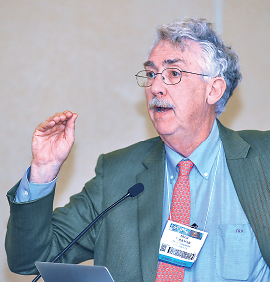Teens, Adults With Autism Need More Support
Abstract
More must be learned about the effects and care of the transition from adolescence to adulthood among people with autism, says psychiatrist Fred Volkmar, M.D.

Fred Volkmar, M.D., says that adolescents being prepared for the transition to adulthold must be explicity taught adaptive skills.
In the past, autism was seen as a disorder of very young children. But children grow up, and far too little is known about autism in adults, said Fred Volkmar, M.D., at APA’s 2013 Institute on Psychiatric Services in Philadelphia in October.
“Autism is a disorder of variability, and it has a tremendous range within the person, across populations, and across time,” said Volkmar, a professor of psychiatry, pediatrics, and psychology at the Yale School of Medicine and director of the Yale Child Study Center.
The social difficulties experienced by people with autism affect how they learn, he pointed out. “A typically developing child takes cues from other people—what they’re looking at, how they respond, how they are feeling as shown by the expression on their faces—and integrates those observations with the context,” he said. “However, children with autism are more interested in things and prefer consistency and stability and have a gestalt learning style and difficulties in multitasking.”
Transitions at each stage of life present challenges for everyone, but adolescents with autism need additional support to cope with new social demands and an awareness of sexuality in themselves and others.
“Outcome studies suggest that some individuals make gains, while others exhibit a decline in function” at this stage, he said.
Preparing adolescents for transition to an adult world requires more than using interventions originally tailored for children, Volkmar maintained. “Adaptive skills must be taught explicitly,” he said, recounting the case of one patient who could do complex mathematics in his head but could not order a hamburger and count the change.
Educational transitions take additional effort. College students are not covered by the same laws as elementary and high school students. If college students self-identify as autistic under the Americans With Disabilities Act, they can receive services and accommodations. But many don’t do that and may behave in socially transgressive ways that get them expelled from school.
However, colleges also can be havens for people with autism. They offer a structured, predictable environment in which a student can control his or her level of social isolation or interaction. Several universities now have supportive programs for students with autism, and others refer students to supports in surrounding towns.
Once youth with autism reach adulthood, additional issues come into play. Adults with autism have an increased risk of being perpetrators or victims of crime or accidents because of their poor judgment, social isolation, literality, and narrowly focused interests, Volkmar noted, like a man in New York who liked to steal buses and subway trains.
Adults with autism may also develop both physical and psychiatric problems as they age, said Volkmar. A sedentary lifestyle (and some medications) may increase risk of obesity. Anxiety and depression are increasingly prevalent as well.
Life after school or college also calls for careful preparation. Ask adults with autism what they want and they will say they’d like safe, secure, quiet places to live and work. However, for more impaired individuals, living and working independently may increase stress and worsen outcomes, he pointed out.
“There are various paths to adult independence and support,” he said. “You need a realistic assessment of the individual, covering more than academic factors and extending to functional, social, and vocational matters.”
Much more research focused specifically on this cohort is needed to provide the evidence base for their lifelong care, Volkmar stated.
Of the approximately 14,000 papers published on autism, only 23 cover interventions for adults. “We need more and better research on the aging process among people with autism, on services, and on outcome measures,” said Volkmar. “Then we need to translate research results into practical applications and disseminate high-quality and understandable information to parents, schools, students, and the public.” ■
Information about the Yale Child Study Center is posted at http://www.childstudycenter.yale.edu/index.aspx. To watch an interview of Volkmar, go to http://www.youtube.com/watch?v=vjJVumJSlKE&feature=c4-overview&list=UUAPLZ4LG-XJgNSB43MbCLRg.



